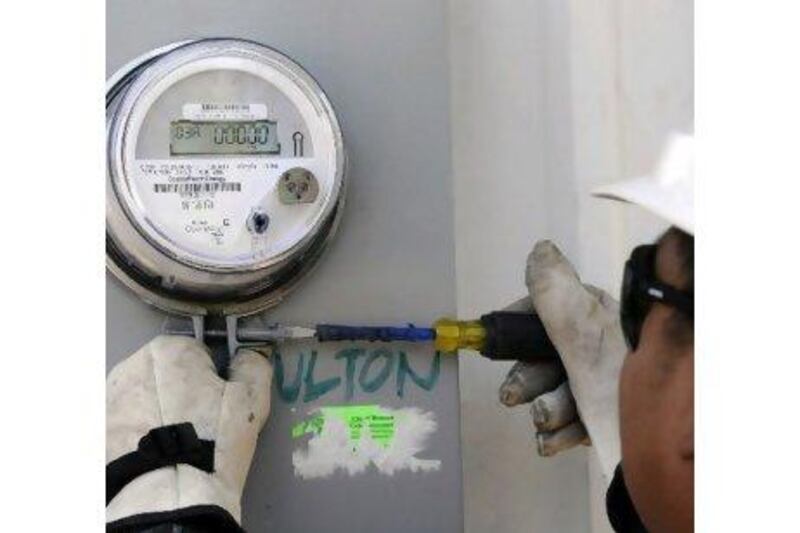Storm clouds are gathering over the booming domestic-energy monitoring sector in the US as concern grows that household electricity smart meters could pose serious health risks.
Investors in this new sector should be aware that, despite its green-energy saving credentials, the smart-metering industry could become the focus of international concern regarding the levels of radiation generated by the new digital devices.
The smart-meter sector is now starting to see a trend towards mergers and acquisitions. But reports in mid-February that smart-meter maker Landis & Gear, believed to be worth roughly US$1 billion (Dh3.67bn), is about to be auctioned coincided with news of mounting anti-smart meter protests in the US.
For three days, residents of Marin County, California, formed a human shield to stop trucks from delivering Pacific Gas and Electric Co's smart meters, due to be installed in their homes. According to the San Jose Mercury News, two female protesters arrested by police said the demonstrations were organised to draw attention to concerns that low-level radiation from the meters posed a serious health risk for children.
There is growing popular antagonism against smart meters in California, where "Stop Smart Meters" signs and bumper stickers have been multiplying on front lawns and cars. In response to these and other fears, such as invasion of privacy, the Californian authorities have imposed bans on smart-meter installation. In Santa Cruz, California, a year-long moratorium has been imposed on smart-meter installation and in Marin County, there is a ban on smart meters in some rural areas. Safety fears are now starting to spread across America, with residents in Maine waging internet-based campaigns and a growing number of towns adopting moratoria on smart meter installations.
Health concerns focus on a condition known as electromagnetic hypersensitivity (EHS). Sufferers claim that the radiation from devices such as mobile phones, WiFi systems and smart meters can cause dizziness, headaches, tiredness and heart palpitations.
Those in favour of installing smart meters claim EHS is the product of pseudoscience. But others point out that the potential long-term ill effects of constant exposure to low-level radiation include cancer. There are also growing fears among some consumers that the long-term effects of constant exposure to wireless radiation may take at least a generation to surface, as was the case with cigarette smoking in the first half of the 20th century.
But while the jury is still out on whether smart meters pose health risks, the energy-monitoring industry is likely to experience a degree of wariness on the part of investors. Markets are driven by "sentiment", a polite word for greed and fear. The fear now among some investors is that the smart-meter industry could be about to suffer a dramatic setback if health concerns begin to escalate globally.
Fears are being further fuelled by fresh safety concerns about the risk of fire from poorly installed smart meters. In California, the anti-smart metering lobby is claiming that poorly trained engineers are installing potentially lethal smart meters. In Australia, the Electrical Union claims that Energy Safe, the industry regulator, is allowing unqualified subcontractors to install smart meters in Victoria.
There are also growing concerns regarding privacy issues. Right-wing groups such as the North Bay Patriots, a Californian affiliate of the Tea Party, insist that smart meters will be an invasion of privacy. Smart meters monitor every aspect of domestic energy consumption and allows consumers to monitor and manage their usage in detail. Companies gearing up to network this vast quantity of data include the search engine giant Google. There is, however, concern that by allowing the utilities and companies such as Google to spy on consumers' personal lives, smart metering could further erode personal privacy.
By monitoring minute-by-minute energy consumption it would, for example, be easy to deduce when people are home or how many individuals are likely to have been there at any one time.
These fears have together created a powerful alliance between California's liberal left, who are mainly concerned about health issues, and right-wing groups who believe the installation of smart meters are the thin end of a wedge of future state intervention into citizens' personal lives.
California's rejection of smart meters could also have investment repercussions way beyond energy-monitoring companies. Smart metering is a central pillar of President Barack Obama's vision of a "green grid" supplying energy nationwide.
Should the US health and privacy fears continue to spread internationally, there could be global consequences.
According to Pike Research, the total installed base of smart meters in the Asia Pacific will increase from 52.8 million in 2010 to 350.3m by 2016. But the global growth of the industry in the Asia Pacific and elsewhere will suffer a severe setback should consumer resistance to smart-meter installation continue to grow throughout 2011.






